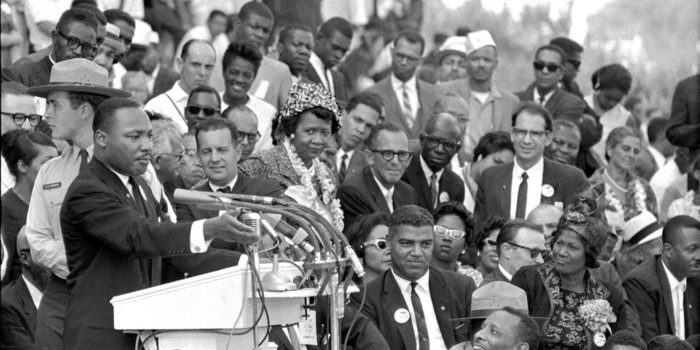(Ken Silva, Headline USA) Every year, the FBI observes Martin Luther King Jr. Day by paying tribute to the civil rights leader.
And every year, hundreds of people remind the FBI of its well-documented history of spying on, harassing and blackmailing King—along with its likely involvement in his assassination.
Monday was no exception, with the FBI posting on Twitter: “This #MLKDay, the #FBI honors one of the most prominent leaders of the Civil Rights movement and reaffirms its commitment to Dr. King’s legacy of fairness and equal justice for all.”
The post was immediately met with widespread mockery from all sides of the political spectrum. The FBI’s tone-deaf tribute also received a “Community Note” from Twitter explaining how the bureau attempted to undermine King’s work.
— The Lectern Guy🇺🇸 (@lecternleader) January 15, 2024
The FBI’s surveillance and harassment of King was revealed in the 1970s by the congressional Church Committee’s investigation.
According to records obtained by the Church Committee, the FBI justified its surveillance of King due to the civil rights movement’s possible connections to communism.
After King’s famous “I Have a Dream” speech, then-FBI Director J. Edgar Hoover told his agents, “We must mark him now, if we have not done so before, as the most dangerous Negro of the future in this Nation from the standpoint of communism, the Negro, and national security.”
Then-Attorney General Robert F. Kennedy approved Hoover’s requests to surveil King, and the FBI proceeded to place wiretaps and bugs in his hotel rooms when he traveled.
Transcripts from the surveillance on King are sealed under judicial order until 2027, but their contents are said to be an open secret.
“The telephone taps largely recorded King thinking out loud, planning the civil rights movement, weighing tactics and strategies. The hotel bugs sometimes picked up the sounds of late-night parties that ended in the unmistakable sounds of sex,” wrote journalist Tim Weiner in Enemies: A History of the FBI.
The Church Committee discovered that the FBI used its surveillance footage of King to blackmail him. Bill Sullivan, who was the FBI’s chief of intelligence, sent the sex tapes along with a “poison pen” letter to King’s family in November 1964, urging him to commit suicide.
“King, look into your heart. You know you are a complete fraud … Lend your sexually psychotic ear to the enclosure. You will find yourself and in all your dirt, filth, evil and moronic talk exposed on the record for all time,” the leader read. “There is but one way out for you. You better take it before your filthy, abnormal, fraudulent self is bared to the nation.”
King was assassinated several years later on April 4, 1968.
Prosecutors blamed a lone gunman, James Earl Ray, for the assassination. Ray pleaded guilty on the advice of his attorney to avoid the death penalty, but he spent the rest of his life in prison declaring his innocence.
King’s widow Coretta Scott King and the couple’s children also suspected a wider conspiracy. In 1999, they won a wrongful death lawsuit against Loyd Jowers and “other unknown co-conspirators,” including government agencies.
“The jury in Memphis declared Mr. Jowers liable in Dr. King’s death for having purportedly hired a now-dead Memphis police officer, as part of a vast conspiracy, to kill Dr. King,” the New York Times reported in 1999. “It also found that unnamed others, including government agencies, had been involved, in effect accepting the plaintiffs’ contention that James Earl Ray was innocent, despite his guilty plea.”
William Pepper, who represented the King family in the civil trial, maintains that Ray was framed by the FBI, the CIA, the military, the Memphis police and organized crime figures from New Orleans and Memphis. He published a book on his findings in 2018 entitled The Plot to Kill King: The Truth Behind the Assassination of Martin Luther King Jr.
Ken Silva is a staff writer at Headline USA. Follow him at twitter.com/jd_cashless.

